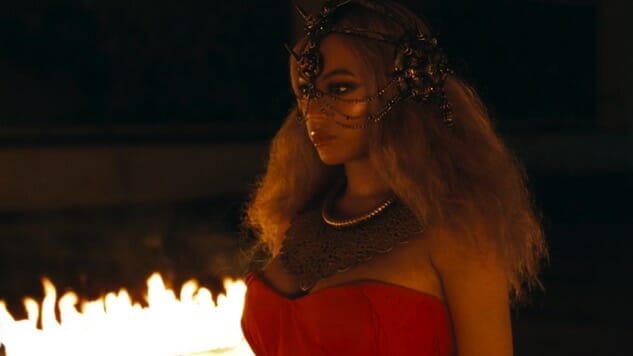
Piers Morgan likes Lemonade, but he’s not sure about Beyoncé anymore. The singer’s sixth record and second visual-album has been described as “a powerful, ambitious statement” by Rolling Stone, a “masterwork” by The Hollywood Reporter—and the efforts of a “black woman political activist…playing the race card” by Piers Morgan. In his Daily Mail column, Morgan calls Lemonade musically “fantastic,” but takes issue with the lately “deeply political and race-fueled tone” in Beyoncé’s work. He opposes the references by an artist he once admired now made to Malcolm X, Hurricane Katrina and policy brutality. After all, why would Beyoncé write something that touches upon black issues when her function is, as Morgan sees it, to “entertain for the sake of entertaining”?
There’s a chance Piers Morgan doesn’t ever really mean what he says; that he’s not a particularly talented journalist, and is fully aware that creating controversy is the only way he’s going to generate career-sustaining hits (you probably already reached this conclusion some time ago). Whether his rudeness is accidental or not, it doesn’t stop his articles from being insulting, and as offensive as you might find Morgan’s latest piece, it’s actually probably worse than you think. When Morgan writes, “I preferred the old Beyoncé,” it sounds not just like he means the black woman who used to know her place, performing for the masses without allowing her perspective as a black woman to encroach upon the music—it also reads like he means the superstar who until now didn’t use her platform to rock the status quo.
Of course culturally, Beyoncé—so famous her world-recognized moniker shrunk from ‘Beyoncé Knowles formerly of Destiny’s Child’ to ‘Beyoncé’ to simply ‘Bey’ in no time at all—has been making an impact for years, creating sonic mega-hits and starring in what some consider to be one of the best videos of all time. But Beyoncé didn’t really start making waves politically until this year, beginning with her Super Bowl 50 performance of the single Formation in February, which saw her backed by an army of dancers dressed in Black Panther uniforms. Now Lemonade, which includes nods to Trayvon Martin and the Black Lives Matter movement, confirms what the Super Bowl show hinted at: that Bey is back with a message.
Not everyone is a fan. The Formation performance provoked the ire of the police, Fox News, and Morgan himself, and the fact that Beyoncé has deepened her political statement on Lemonade has only incensed the latter further. Beyoncé is in 2016 using her music to speak up for and offer strength to the black community, in particular black women. It’s hardly surprising that Fox News would be troubled by this, and it’s not so shocking that Morgan, an oft-misguided sort who can’t seem to wrap his head around the concept of white privilege (see his piece from last year on Nicki Minaj and Black Twitter), is also expressing unease. Morgan’s opposition to New Bey, though, doesn’t stem merely from a place of casual, know-your-role racism. (Such casual racial superiority is surprisingly alive and well among the British higher classes, like a colonial hangover that just won’t disappear. Only last week, Boris Johnson wrote that Barack Obama had an “ancestral dislike of the British Empire” because he’s “part-Kenyan.” Johnson’s likely our next Prime Minister, just FYI.)
The Daily Mail, aka Britain’s New York Post, which published Morgan’s column, is notorious for vaunting stars only to turn on them when they use their celebrity to draw public attention to real-world problems. The Mail considered Benedict Cumberbatch and Emma Thompson to be national treasures until they began arguing in favor respectively of the European Union and sheltering refugees, both of which the Mail generally opposes. Russell Brand, meanwhile, was a source of constant tabloid fascination back when he was just a randy comedian with gigantic hair. Then, when he transformed himself into a political commentator and activist, the press on both sides of the Atlantic declared war, with the UK’s largest newspaper The Sun and the US’s largest cable news network Fox News (both owned by Rupert Murdoch, incidentally) lining up to take him out.
The idea—Morgan’s idea, and the industry-at-large’s idea—is that a celebrity must know their place, that they should be prepared for criticism if they’re to ever shift just an inch. Unfortunately for those stars who the media consider theirs to build up or knock down, celebs are also human beings that sometimes happen to have opinions of their own; they are artists who occasionally use their art to express personal political concerns. Morgan, the Mail, the Murdoch press and the like believe that this isn’t permitted. They would prefer Beyoncé’s most recent work was more gossip and less about black and female issues. After all, entertainers are for entertaining, while it’s the journalist’s job to inform and empower the citizen. Right?
To Morgan, Beyoncé was better when she kept her mouth shut. He preferred her “studiously clear of saying or doing anything too contentious,” and not stepping out of line by going “all political” (evidence of a brilliant journalistic mind in every word). To Morgan, it’s the stars who politely take tea with him in Harrods and speak only of trivial things that deserve reverential treatment, while it should be left up to him and his fellow journos to provide the social and political commentary. But really, why should any celeb who does speak out be demonized for using their fame to raise some crucial awareness? God knows that Piers Morgan and his right-wing media companions haven’t been too successful at addressing the matter of racial tension in the US, so maybe it’s not so bad that the likes of Beyoncé are doing the job for them.